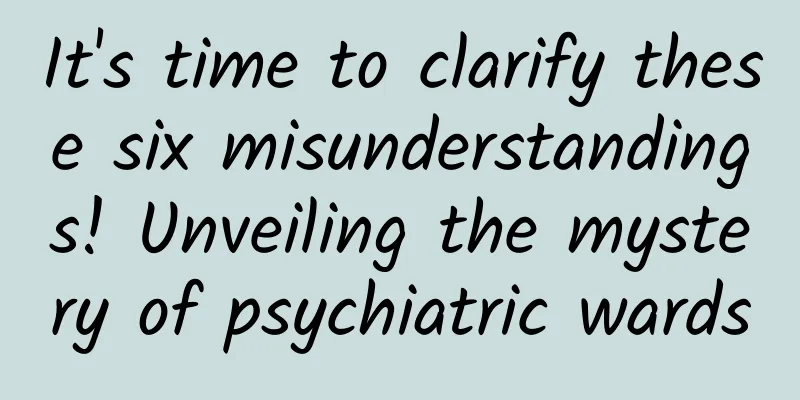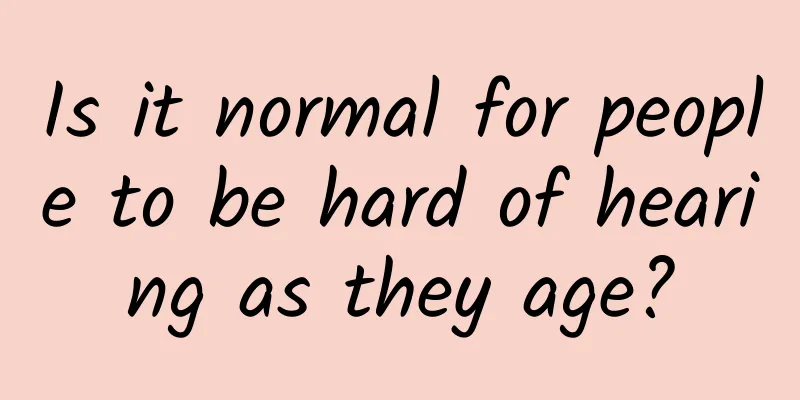It's time to clarify these six misunderstandings! Unveiling the mystery of psychiatric wards

|
According to the World Mental Health Report released by the World Health Organization (WHO) in 2022, nearly 1 billion people in the world suffer from mental illness. By the end of 2021, there were 6.6 million patients with severe mental disorders registered in my country's database. In this area shrouded in misunderstanding and prejudice, psychiatric wards, as professional places for treating patients with mental illness, often become a place full of questions and curiosity in the minds of the public. Today, as an "old driver" who has worked hard in the closed psychiatric ward for 15 years, I will lead everyone on this journey of exploration, unveil the mystery of the psychiatric ward, and take you to appreciate this space full of hope and care. Q1: Are all patients with mental illness locked up when hospitalized? A1: This is a big misunderstanding! Psychiatric wards are actually divided into two types: open and closed. Outpatient doctors will tailor the most suitable hospitalization plan for the patient based on their specific situation. Only those patients who have impulsive hurting, suicidal and self-harming behaviors, lack of self-awareness or refuse to cooperate with treatment will be arranged for closed hospitalization. Q2: During closed inpatient treatment, will the patient be beaten or tied up if he/she is disobedient? A2: Absolutely not! In the psychiatric ward, we follow the principles of humanity and professionalism. Only when the patient shows impulsive hurting, serious suicidal or self-harming behavior or tendency, after strict evaluation by doctors and nurses and with the consent of the family, will protective restraint be carried out. During the restraint period, we will ensure that the patient's physiological needs are met and provide psychological counseling. Once the patient's emotions are stable, the restraint will be released immediately. Q3: Is the closed ward like a prison, with iron doors and windows? A3: Of course not! The design of the psychiatric ward takes full account of the comfort and safety of the patients. The ward is equipped with furniture without sharp corners, spacious and bright, avoiding the discomfort caused by long-term closure. In addition, the ward is also equipped with an activity room, a reading corner, a soft-padded emotional venting room, etc. Every detail reflects the meticulous care for the patients. Q4: Are all the patients in the psychiatric wards suffering from behavioral disorders such as hitting others, swearing, stripping off clothes and pants, and talking nonsense? A4: This is a common misunderstanding. In fact, there are many types of mental illness, including depression, anxiety, schizophrenia, bipolar disorder, etc. In fact, only a few patients will show symptoms of behavioral disorders, and most patients behave relatively normally. They may just show symptoms such as auditory hallucinations, delusions, emotional indifference, and laziness in life. Q5: Is the hospitalization life of patients with mental illness boring? A5: Quite the opposite! In the psychiatric ward, we tailor a colorful hospital life for patients. The closed ward has a detailed schedule of work and rest. Medical staff will lead patients to carry out a series of activities according to the type of disease, such as health exercises, music therapy, painting therapy, occupational therapy, group games, health education lectures, movie appreciation, chess and card games, karaoke, etc., so that patients can get comprehensive physical and mental healing during hospitalization. The open ward is similar to the general physical disease department. Patients can enter and exit freely and choose the treatment method. Q6: Does hospitalization mean taking medicine? A6: Of course not! In the psychiatric ward, drug therapy, psychotherapy and electroconvulsive therapy are known as the "three magic weapons". Electroconvulsive therapy is a new type of physical therapy that can quickly control mental symptoms. It is suitable for patients with refractory mental illness, severe suicidal and self-harming behaviors and tendencies, extreme excitement and impulse, hurting and destroying behaviors, and intolerance to antipsychotic drug treatment. Psychotherapy can improve mental symptoms, improve patients' medication compliance, improve patients' social skills, enhance self-awareness, and effectively reduce disease recurrence. Psychiatric wards are not only places where patients with mental illness receive treatment and rehabilitation, but also a space full of understanding, care and hope. Correctly understanding mental illness and its treatment is not only related to the health of patients, but also to the harmony and stability of society. Let us work together to contribute to the cause of mental health! Hunan Medical Chat Special Author: Luo Yun, a male adult psychiatrist at the Hunan Second People's Hospital (Provincial Brain Hospital) Follow @湖南医聊 to get more health science information! (Edited by YT) The cover image of this article comes from the copyright library. Reprinting and using it may cause copyright disputes |
>>: Is it more convenient and easier for the elderly to drink juice than to eat fruit?
Recommend
Is it good to use a belly belt for cesarean section?
The belly belt used for cesarean section is to he...
How to regulate the excessive moisture in women's body
In summer, it is easy to be eroded by moisture in...
Is it okay to put the sofa not against the wall? How to decorate the sofa if it is not against the wall?
We all know that the sofa is an indispensable pie...
Can a 38-day-old baby be taken out? What are the precautions for taking a 38-day-old baby out?
We all know that babies are weak and have poor re...
Do women have stomach pain during ovulation?
Menstruation is something that every woman has, b...
What to do if your baby doesn't have enough milk for two months
Even though there are various kinds of infant for...
Menopause occurs in both men and women? How to adjust your diet? What should you pay attention to in your life? Huaxi doctors say...
As the saying goes "When you reach middle ag...
What to do if a woman has too strong sexual desire
A woman's excessive sexual desire can cause h...
When is the best time for women to conceive each month?
Every woman of childbearing age hopes to get preg...
Wang Lixiang and Wang Guiqiang: Weighing Your Weight on World Obesity Day - Part 2 of "Managing the "Desire to Become Weight" in Central Control
Obesity is a common metabolic syndrome. The WHO h...
Fetal size chart at 2 and a half months of pregnancy
Entering the second month of pregnancy, you shoul...
What is the cause of pain on the left side of the lower abdomen in women?
In daily life, we may often hear female colleague...
My period has not come for two days.
Some women of childbearing age find that their me...
How can hcg be tested to determine whether it is an ectopic pregnancy?
Compared with normal pregnancy, ectopic pregnancy...









